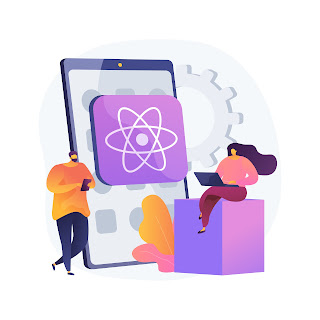Whether you're using Uber Eats or a comparable app, it's likely already on your phone. You will be acquainted with Walmart, Instagram, Skype, and Facebook services. As a company owner, you've probably wondered what creating an app like this would take. This kind of application is built using the React Native framework.
React Native developers if you're looking to create feature-packed, intuitive mobile applications. You can have native applications built for Android and iOS by a skilled React Native developer; the choice is yours, based on your budget.
What is React Native?
Verify your familiarity with React Native before proceeding. Doing so will prepare you to ask a developer specializing in this technology the right questions.
The open-source JavaScript framework known as React Native was created by Facebook, in case you didn't know. With this framework, developers just need to write their apps once to have them function on several platforms, including iOS and Android.
React Native developers- The work they do
A master React.js developer will have a firm grasp of JavaScript and experience with API services, cross-platform technologies, and the many native platforms that comprise the app.
One or more of the following also falls within the purview of React Native:
- Acquire the skills necessary to develop complex software.
- Capable of identifying problems and finding solutions.
- You may make your React web app mobile-friendly by migrating it to React Native.
- Reducing the performance gap between native and cross-platform applications.
- Elevating components to get peak performance.
- The ability to work on React modules as required is a must.
- Making use of the Redux framework to boost the app's performance.
- Intended to facilitate software testing automation.
Important considerations while recruiting React Native developers
When you're looking to hire a dedicated React Native mobile app developer from a React.js development company, keep these points in mind.
1. JavaScript expertise
Verify their JavaScript proficiency before contacting them for React.js development services or employing them for React Native app development. One may use JavaScript to organize the program's logic, comprehend its flow, and construct strong components.
2. Components and functionalities of React Native
Understanding JSK, Virtual DOM, and the component lifecycle is essential for any reputable, experienced React development agency. Verify that the candidate is well-versed in all aspects of React Native before employing them.
Developers must have the ability to customize and control the state and settings of React components. This makes it possible to onboard the whole development process with relative ease.
3. Writing functional and clean codes
Experienced React Native developers must deeply understand building applications on several platforms. In the future, it will be crucial to maintain it and make any required improvements.
Everyone working on an app has to be able to write clean, functioning scripts if the process is to go smoothly. On top of that, developers need to know exactly where various codes intersect. To begin developing code, familiarize yourself with the various code classes, build mock tests, and locate fragments and events based on React Native.
4. Incorporating native features
On-demand, the React Native team is also supposed to be able to build native features. When hiring developers, ensure they have experience with native frameworks like Swift, Android Studio, Objective C, and others. They should also have a good grasp of the platform's properties.
If you want to create mobile applications with amazing user interfaces and personalized widgets that consumers won't quickly forget, hiring React Native developers should be your ultimate goal. The many in-built capabilities of the smartphone—its speakers, cameras, GPS, and more—make all of this feasible.
Why hire React Native developers?
Hiring dedicated React Native app developers is a smart move for businesses seeking to build cross-platform mobile apps at a reasonable price. Businesses can use both the iOS and Android platforms using React Native, all while maintaining high-quality and rapid market entry.
1. Faster development time
Because it is easy to reuse code between platforms, developers might save time by utilizing React Native. Its vast library of third-party plug-ins makes the complete development cycle easier. For example, JavaScript is a programming language with support for modules and extensions built right in. The npm Registry and the React Native Directory are two places you could look for these extensions.
You may see the changes to the code as they happen using React Native's live reload feature. Programmers aiming to shorten the often lengthy compilation time of native languages like Java may find this feature handy.
2. High performance and scalability
React Native is a popular and powerful framework built in JavaScript that developers may use to construct fast, scalable mobile applications. The animations are more fluid, and the load times are faster thanks to the native components and enhanced rendering. Because app components are modular and reusable, it's easier to maintain and update the app, making it more scalable.
3. Cutting costs
React Native is a free, open-source, and barrier-free framework. Businesses may save significant money by hiring React Native specialists rather than paying premium salaries to developers with experience in other platforms.
Conclusion
Hiring skilled React Native developers is crucial if you want to build first-rate mobile applications that meet your business needs. Following the aforementioned methods will help you optimize your recruitment strategy and attract top tech talent.
Related Post












.jpg)
